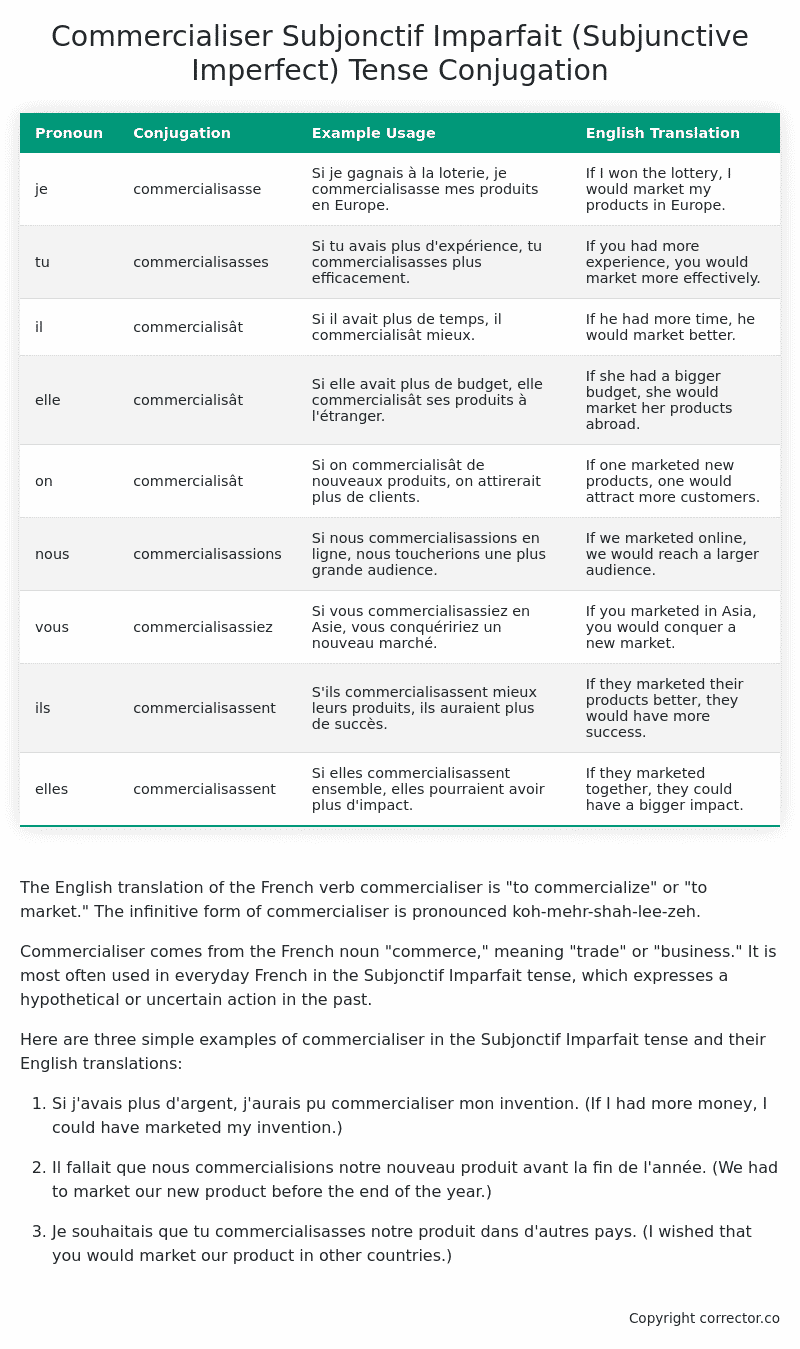Subjonctif Imparfait (Subjunctive Imperfect) Tense Conjugation of the French Verb commercialiser
Introduction to the verb commercialiser
The English translation of the French verb commercialiser is “to commercialize” or “to market.” The infinitive form of commercialiser is pronounced koh-mehr-shah-lee-zeh.
Commercialiser comes from the French noun “commerce,” meaning “trade” or “business.” It is most often used in everyday French in the Subjonctif Imparfait tense, which expresses a hypothetical or uncertain action in the past.
Here are three simple examples of commercialiser in the Subjonctif Imparfait tense and their English translations:
-
Si j’avais plus d’argent, j’aurais pu commercialiser mon invention. (If I had more money, I could have marketed my invention.)
-
Il fallait que nous commercialisions notre nouveau produit avant la fin de l’année. (We had to market our new product before the end of the year.)
-
Je souhaitais que tu commercialisasses notre produit dans d’autres pays. (I wished that you would market our product in other countries.)
Table of the Subjonctif Imparfait (Subjunctive Imperfect) Tense Conjugation of commercialiser
| Pronoun | Conjugation | Example Usage | English Translation |
|---|---|---|---|
| je | commercialisasse | Si je gagnais à la loterie, je commercialisasse mes produits en Europe. | If I won the lottery, I would market my products in Europe. |
| tu | commercialisasses | Si tu avais plus d’expérience, tu commercialisasses plus efficacement. | If you had more experience, you would market more effectively. |
| il | commercialisât | Si il avait plus de temps, il commercialisât mieux. | If he had more time, he would market better. |
| elle | commercialisât | Si elle avait plus de budget, elle commercialisât ses produits à l’étranger. | If she had a bigger budget, she would market her products abroad. |
| on | commercialisât | Si on commercialisât de nouveaux produits, on attirerait plus de clients. | If one marketed new products, one would attract more customers. |
| nous | commercialisassions | Si nous commercialisassions en ligne, nous toucherions une plus grande audience. | If we marketed online, we would reach a larger audience. |
| vous | commercialisassiez | Si vous commercialisassiez en Asie, vous conquéririez un nouveau marché. | If you marketed in Asia, you would conquer a new market. |
| ils | commercialisassent | S’ils commercialisassent mieux leurs produits, ils auraient plus de succès. | If they marketed their products better, they would have more success. |
| elles | commercialisassent | Si elles commercialisassent ensemble, elles pourraient avoir plus d’impact. | If they marketed together, they could have a bigger impact. |
Other Conjugations for Commercialiser.
Le Present (Present Tense) Conjugation of the French Verb commercialiser
Imparfait (Imperfect) Tense Conjugation of the French Verb commercialiser
Passé Simple (Simple Past) Tense Conjugation of the French Verb commercialiser
Passé Composé (Present Perfect) Tense Conjugation of the French Verb commercialiser
Futur Simple (Simple Future) Tense Conjugation of the French Verb commercialiser
Futur Proche (Near Future) Tense Conjugation of the French Verb commercialiser
Plus-que-parfait (Pluperfect) Tense Conjugation of the French Verb commercialiser
Passé Antérieur (Past Anterior) Tense Conjugation of the French Verb commercialiser
Futur Antérieur (Future Anterior) Tense Conjugation of the French Verb commercialiser
Subjonctif Présent (Subjunctive Present) Tense Conjugation of the French Verb commercialiser
Subjonctif Passé (Subjunctive Past) Tense Conjugation of the French Verb commercialiser
Subjonctif Imparfait (Subjunctive Imperfect) Tense Conjugation of the French Verb commercialiser (this article)
Conditionnel Présent (Conditional Present) Tense Conjugation of the French Verb commercialiser
Conditionnel Passé (Conditional Past) Tense Conjugation of the French Verb commercialiser
L’impératif Présent (Imperative Present) Tense Conjugation of the French Verb commercialiser
L’infinitif Présent (Infinitive Present) Tense Conjugation of the French Verb commercialiser
Struggling with French verbs or the language in general? Why not use our free French Grammar Checker – no registration required!
Get a FREE Download Study Sheet of this Conjugation 🔥
Simply right click the image below, click “save image” and get your free reference for the commercialiser Subjonctif Imparfait tense conjugation!

Commercialiser – About the French Subjonctif Imparfait (Subjunctive Imperfect) Tense
Formation
Common Everyday Usage Patterns
Interactions with Other Tenses
Subjonctif Présent
Indicatif Passé Composé
Conditional
Conditional Perfect
Summary
I hope you enjoyed this article on the verb commercialiser. Still in a learning mood? Check out another TOTALLY random French verb conjugation!


